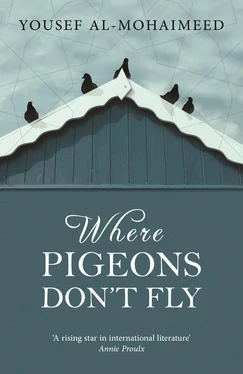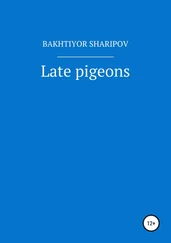‘Who is it?’
‘Don’t know,’ he answered as he went downstairs over the cheap black carpet.
He opened the door. There were five of them and they greeted him. Ibrahim gave a smooth apology. ‘So sorry for turning up without an appointment or a phone call.’
‘This is your house, Uncle,’ Fahd said politely. ‘You don’t need to call ahead and make appointments.’
Yasser stared at the poster of a Paul Klee abstract depicting a fisherman in his boat then looked over at his father. ‘Representations of living creatures aren’t permitted, nor is glorifying them and hanging them on walls.’
Fahd longed to scream in his face: ‘What’s it to you, scumbag? Is this house yours or ours?’
As Yasser’s father nodded his agreement, Ibrahim deftly took up the conversation. ‘It’s none of our business. Is that why we’re here, Yasser? Fahd,’ he continued, ‘you know that the fingernail never leaves the flesh: you’re part of us my boy and there is no one closer to you and your sister than your Uncle Saleh.’
The fan in the ceiling turned sluggishly as his words took flight, sometimes settling on Fahd’s ears and sometimes floating through the majlis window to the alleyway outside.
Yasser stroked his forked beard with his long fingers as he watched out of the corner of his eye from behind his spectacles, his loosely draped shimagh pulled back to show the front half of his white skullcap and a set of coloured pens proudly arrayed in his breast pocket. How Fahd would have loved to see Yasser turn up with his white doctor’s uniform and (why not?) a stethoscope hung around his neck or carried in his breast pocket.
Yasser was in his fourth year studying medicine at King Saud University. His enrolment there had been enough for his father to leave their home in Buraida and move to Quds in East Riyadh. No sooner had Yasser’s feet stepped over the threshold of the College of Medicine than he fell in with some religious students, standing shoulder to shoulder with them as they set out to put heavenly reward before earthly success and battle with the dean of the college to prevent male and female students mingling in the laboratories of King Khaled University Hospital.
They wrote one complaint after another and faxed them off, once to the rector, another time to the governor of Riyadh, a third time to the Interior Ministry, and occasionally to the king himself, while they fanned the flames on Islamic websites.
Yasser had not wanted to study medicine but his father had forced him so he could show off to people about his son. After completing his first year, he planned to transfer to study aqeeda at the College of Sharia in Imam Mohammed Bin Saud Islamic University and asked an ultraconservative sheikh for his opinion. Instead of telling him to study medicine and use his knowledge to benefit the umma , the sheikh declared that it was a worldly and useless subject, and that God had not included it amongst those branches of learning extolled in the verses of the Qur’an.
‘There’s mixing of the sexes, as well, sheikh!’ Yasser added, to ensure the sheikh would make him abandon the sins and studies of the unbelievers. Instead, the sheikh fell silent for a moment then surprised him by insisting that he continue with his medical studies to fight against the corrupting influence of co-education.
‘There is more than one type of jihad , my son,’ he said, ‘and the jihad of you and your fellow students, the struggle against mixed classes and moral degeneracy, is the greatest of them all. Your duty is to fight the hypocritical secularists wherever you find them, for as you know, moral degeneracy is one of the causes of the collapse of societies and states.’
And so Yasser stayed on at the college, inciting his fellow students against the university authorities, groups of them walking in on the dean and occasionally making official complaints about the department and the dean to the rector himself. If necessary they would collaborate with others outside the university and send telegrams to the king and crown prince, warning of the problems created by allowing students of both sexes to study side by side in the university’s laboratories and dissection classes, in operating theatres, hospital corridors and common rooms.
So he fought, as his sheikh had suggested, withdrawing from his studies and striving hard in the distribution of little booklets and cassettes that warned young Muslim women of the dangers of mixing with men, expounding the religious rulings that forbade it and talking of the threat it posed to the umma .
Saeed knew Yasser. He would sometimes run into him at biology lectures in the College of Science. More than once he had seen him leading a bunch of students through the reception hall of the university’s administration building, sprinting towards the lifts on their way to see the rector.
‘Sometimes I wonder how he manages to pass in a difficult subject like medicine when he’s so busy with complaints and statements,’ Fahd said one day at Saeed’s flat.
Saeed gave a mirthless smile, leaping towards the kettle in the kitchen area in the corner when he heard the sound of boiling water and the pop of its automatic switch. He started preparing two cups of tea.
‘You know that they’ve got doctors with the same extremist beliefs? They fix their marks, even if they don’t deserve them. I heard worse than that: they’ve got extremist friends in the IT department who can access student records and their grades, pass and fail and so on.’
‘But how?’ said Fahd, astonished.
‘It’s no problem. They’ll change an F to D, or even higher. Helping those Brothers who are distracted from their studies by the war on corruption and temptation and the battle against the secularists in the university brings them heavenly reward.’
Then Saeed laughed, and, stirring the tea, shouted, ‘Long live the Arab nation!’
‘And the Islamic nation,’ he added, bringing the cups over.
Some months later they were back in the flat flipping through the papers. Fahd was reading a long article in Riyadh about the imposition of a uniform dress code for all female Saudi employees in the health services. Doctors, pharmacists and nurses were forbidden from wearing jeans, were required to cover their hair, must have no gold or other jewellery on them, nor wear nail polish or make-up, and had to use rubber-soled shoes that made no sound when they walked, with heels less than five centimetres high. Fahd was reading these details out loud to Saeed, and they both thought of Yasser and his jihad ; Yasser, the holy warrior doctor who championed his Faith in the College of Medicine.
‘I can understand everything except for this business with the rubber soles.’
‘So they don’t make a sound when they walk,’ said Saeed sagaciously.
‘Well, I realise that, but so what if they do make a sound? What could possibly happen?’
‘Sound, my friend, attracts attention to the seductive motion of the female form!’
‘I don’t get it,’ Fahd said.
‘Anyone who hears that sound, even if they don’t actually see the lady doctor, will still picture her in their mind — her buttocks, her swaying breasts — and he’ll desire her.’ Saeed laughed.
‘What? So even the click of a heel is shameful, now?’
‘Of course. It leads to temptation.’
Saeed dropped a Lipton teabag into one of the cups.
‘Know something, Fahd? Sometimes I think we’re lucky to be living in a time like this, and in this place in particular. Bizarre things like this could lead to the creation of bitterly dark art and theatre. Unfortunately, art itself is also under attack and outlawed.’
Fahd let out an uncharacteristically loud laugh and said, ‘Just imagine: every female doctor and pharmacist will put a little ruler in her bag and when she gets a new pair of rubber-soled shoes, out with the ruler to check if the heel’s higher than five centimetres.’
Читать дальше












